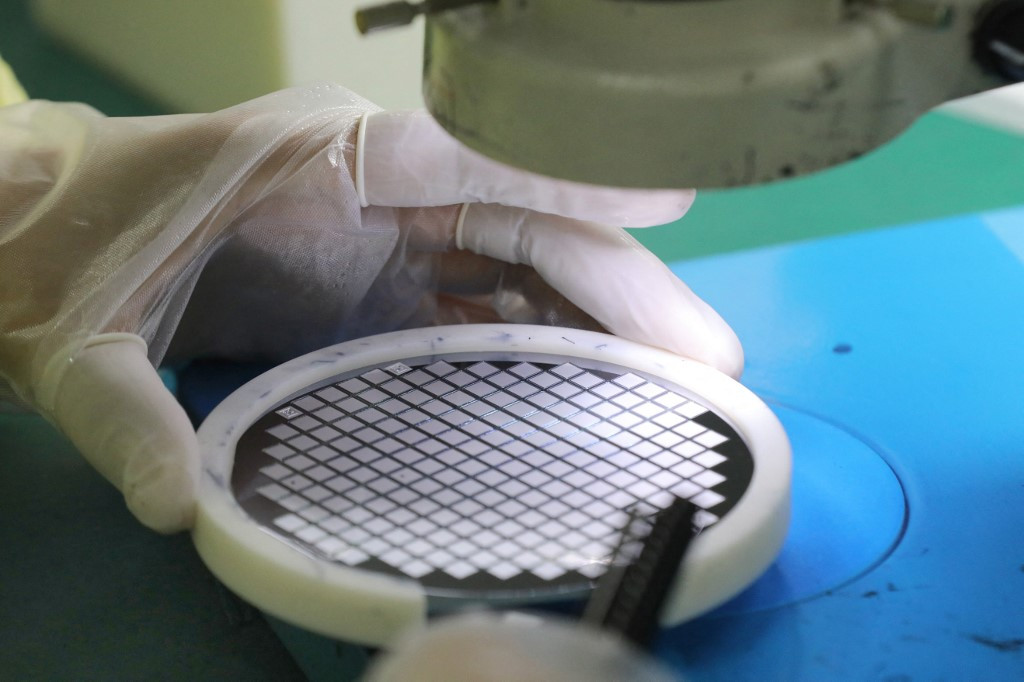China tech shares sink as US export curbs raise chip sector hurdles
Change Size
 An employee makes a chip at a factory of Jiejie Semiconductor Company in Nantong, in eastern China's Jiangsu province on March 17, 2021. (AFP/STR)
An employee makes a chip at a factory of Jiejie Semiconductor Company in Nantong, in eastern China's Jiangsu province on March 17, 2021. (AFP/STR)
S
hares in Chinese tech giants Alibaba Group and Tencent as well as in chipmakers slumped on Monday, as investors were spooked by new US export control measures aimed at slowing Beijing's technological and military advances.
The Biden administration published a sweeping set of export controls on Friday, including a measure to cut China off from certain semiconductor chips made anywhere in the world with US equipment.
The raft of measures, some of which take immediate effect, could amount to the biggest shift in US policy toward shipping technology to China since the 1990s.
Experts expect the new rules will have a broad impact, slowing China's efforts to develop its own chip industry and advance commercial and state research involving military weapons, artificial intelligence, data centres and many other areas that are powered by supercomputers and high-end chips.
The new controls also come at a time when the global chip industry is already facing major headwinds from tumbling demand post-COVID in computers, smartphones and other electronic devices and has warned of weak revenue.
The most immediate impact is likely to be felt by Chinese chipmakers, they said.
Under the new regulations, US companies must cease supplying Chinese chipmakers with equipment that can produce relatively advanced chips - logic chips under 16 nanometers (nm), DRAM chips below 18 nm, and NAND chips with 28 layers or more – unless they first obtain a license.
That's set to affect China's top contract chipmakers - Semiconductor Manufacturing International Corp (SMIC) and Hua Hong Semiconductor Ltd – as well as state-backed leading memory chipmakers Yangtze Memory Technologies Co Ltd (YMTC) and Changxin Memory Technologies (CXMT).
"The US restrictions could make development of China's advanced chip technologies even more challenging," Citi analysts said in a note.
Industry watchers have pegged YMTC and CXMT as China's best hopes for breaking into the global memory chip market, going neck and neck with memory chip giants such as Samsung Electronics and Micron Technology.
The new regulations will now pose very large hurdles for the two Chinese memory chipmakers, analysts said.
"The advancement of memory will be limited as there is no opportunity to upgrade process equipment, no opportunity to expand production, and the market will be lost," Gu Wenjun, who leads research at Shanghai-based consultancy ICWise, wrote in a research note.
Citi analysts said in another report that contract chipmaker SMIC would find it challenging to penetrate into more advanced applications due to limited access to chip equipment and technology support from the US and international suppliers.
The rules also include blocking shipments of a broad array of chips for use in Chinese supercomputing systems which can be used to develop nuclear weapons and other military technologies.
Some industry experts say the ban could also hit commercial data centers at Chinese tech giants. Shares in e-commerce company Alibaba and social media and gaming company Tencent, both of which rely on data centres extensively, dropped 3.3 percent and 1.7 percent, respectively, at 0258 GMT.
A steep decline in tech shares led China's market down on its first post-Golden Week holiday trading on Monday.
An index measuring China's semiconductor firms tumbled nearly 6 percent, and Shanghai's tech-focused board STAR Market declined 3.6 percent.
SMIC dropped 3.8 percent, chip equipment maker NAURA Technology Group Co sank 10 percent by the daily limit, and Hua Hong Semiconductor plunged 9.5 percent.
Shares in AI research firm Sensetime and surveillance equipment maker Dahua Technology, which will be cut off from chips made using US technologies, tumbled 4.4 percent and 10 percent, respectively.
The impact on tech shares outside of China was limited on Monday as financial markets in South Korea, Japan and Taiwan were closed for separate holidays.










